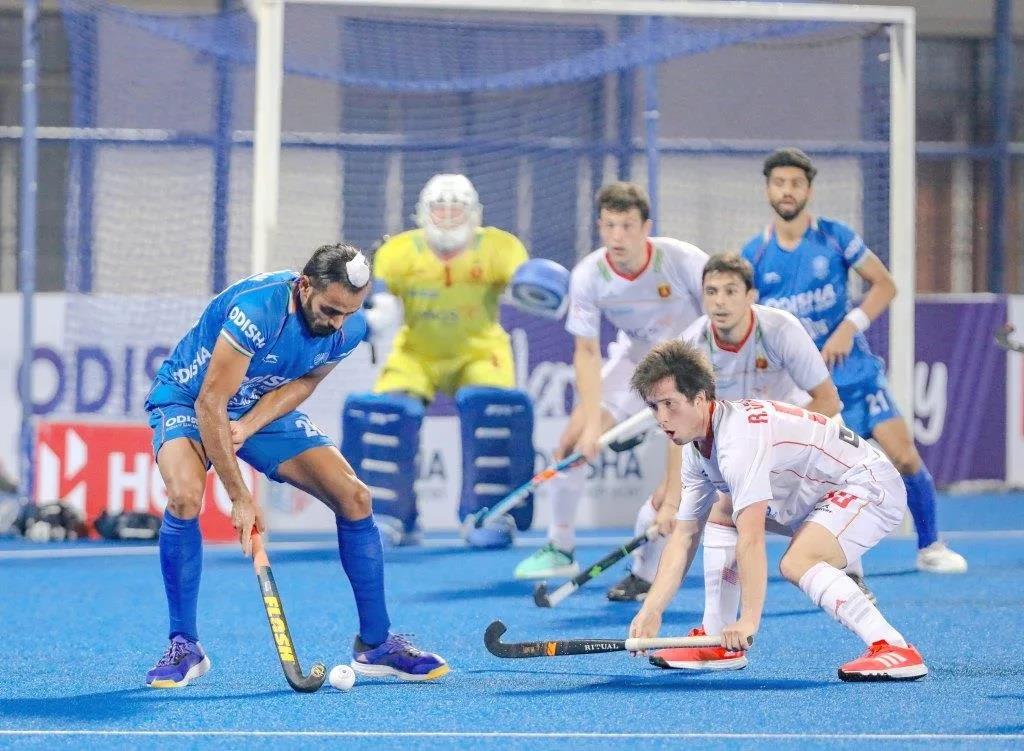
Indervir Grewal
Chandigarh, March 8
Manpreet Singh was not too dejected after India's loss to Spain last Sunday. "We played a good gamehellip; missed a couple of good opportunities," the captain said after the 3-5 loss. With India hosting Germany on March 12-13, Manpreet said they had enough time to work on "our things" and "come back stronger". Manpreet did not specify what 'things' they needed to work on, but it is easy to point out some of the obvious issues.
Soft goals
Their efficiency in front of goal is one of the reasons for their struggles. In their 2-5 defeat to France and 5-4 come-from-behind win over Spain, India had considerably more number of circle entries, shots on goal and penalty corners than their opponents.
India have also been leaking goals — in their six FIH Pro League games this season, India have conceded 18 times. A big reason has been the occasional lapses, but India have also been let down by their goalkeepers. Youngsters Krishan Pathak and Suraj Karkera let in a few soft goals. Even PR Sreejesh was twice guilty of conceding through his pads.
On the attack
These issues notwithstanding, India have looked impressive in attack.
Over the last few years, India have been known for their speed in attack. Prominently relying on fast counterattacks, India have also used long passes, especially taking the aerial route, to quickly get the ball into the opponent's defensive third. However, in the Pro League season so far, India have shown variety. Particularly against Spain, they were impressive in the way they switched flanks quickly, used the wider channels or even found space through the middle of the pitch with one-touch passes.
The most impressive aspect was the space-creation by the Indian attackers — the forwards were especially slick in and around the semicircle.
Speed thrills
Though fast-paced, India's attack lacks variation in tempo. India prefer a directness in attack — they like to reach the opponent's semicircle as quickly as possible. It also means they do not hold on to the ball for long. Every time that final play does not work out, and India give away possession, they also lose some control over the game.
However, dominating the possession percentage has not been a facet of India's game. Their favoured tactic has been to press high, win back the ball and hit on the counter. But when the opposition has managed to break that press, India have seemed to struggle.
Spain exposed India's weaknesses perfectly. In the first game, their defenders gave too much space to the Indian forwards, who were easily receiving the ball inside the semicircle. In the next game, Spain tightened their man-marking, meaning India's circle entries fell from 34 to 22, penalty corners from six to three and shots from 16 to 10.
Smart in possession
Spain were also smart and strong in possession as they blunted India by reducing the number of turnovers. More importantly, Spain dictated the tempo of the game. Varying the pace constantly, they played a stop-go game. They forced India into a lull and attacked in small bursts, catching the opposition off guard to earn penalty corners. Spain converted seven of the 12 penalty corners they earned in the two games.
That slowdown also forced India's intensity to drop. Being marginally slower meant their defensive press did not work optimally, they did not win as many common balls and made fewer interceptions. Even their attacking game suffered as basic errors crept in when they tried to up the tempo suddenly. In his interview before the second Spain match, India coach Graham Reid said, "What we want is a repeat of the second half (from the first game). We need to put pressure on them."
However, the situation in the two games was completely different. Trailing 1-4 with 20 minutes to go in the first game, India's only option was an all-out effort. There was no need to pace themselves, they had to play at full intensity. It helped that Spain gifted them goals after making big errors. The second game, however, never got out of India's reach, except near the end. The score stayed 3-2 in Spain's favour for a long time, so India did not need to panic. They did get the equaliser, but Spain controlled the pace. India could not earn a single penalty corner in the final quarter.
A worrying sign for Reid would be India struggling to cope with France and Spain raising their game after losing the first matches. Adding to Reid's frustrations, India also failed to learn from their own mistakes.